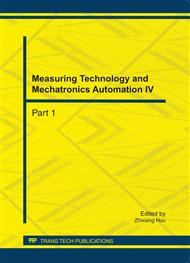p.749
p.753
p.761
p.765
p.771
p.775
p.780
p.784
p.789
A Cooperative Co-Evolutionary Controller for AC Induction Motor
Abstract:
Considering the nonlinearity and strong coupling of AC induction motor, a co-evolutionary control method is proposed for it,based on this method, distribution function is introduced to regulate the probabilities of individuals production to promote the speed of evolutionary according to the characteristic of control system . Compared with the traditional genetic algorithm, the searching space has been decreased greatly by the method. Furthermore, tested on AC induction motor, the controller in this paper has the traits of high-speed response and small overshoot so on.
Info:
Periodical:
Pages:
771-774
Citation:
Online since:
October 2011
Authors:
Price:
Сopyright:
© 2012 Trans Tech Publications Ltd. All Rights Reserved
Share:
Citation:


